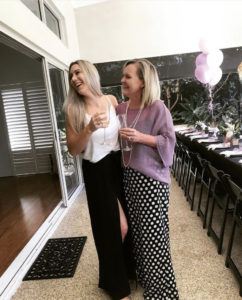Emily Wheeler,
Australia (1998)
Once she was diagnosed with HAE, Emily Wheeler felt very relieved that she had answers – and access to modern treatment.
I experienced the first HAE attack in 2018 – I was 19 at that time. I had just moved to Perth to start my nursing studies at the university, and I was in my first semester of study.
The first symptom I had was swelling of my left foot. It was a slow and gradual swelling that happened over 24 hours. I thought I had an allergic reaction to something, so I went to the doctors and was told I had gout and given some mysterious medication. They never told me what it was. Three pills were placed in an envelope and given to me, and they told me to come back in the morning for a follow-up appointment. I had two of the pills as instructed. About an hour later, I started vomiting uncontrollably and had excruciating pain in my abdomen. I went to the hospital, where they stopped the vomiting and gave me pain relief. My feet swelling started to go down, and the vomiting and pain stopped after several hours.
There was no HAE diagnosis at that point?
No, the swelling in my feet was ruled as an allergic reaction and undiagnosed. The vomiting and pain were diagnosed as a result of the pills I was given. The next morning, I was sent home feeling much better and my feet swelling almost gone. The following night I was in the shower, and I noticed my abdomen beginning to swell. I went from having a flat stomach to looking six months pregnant within about half an hour. Alongside this, I had pain, so I went back to the hospital. It was St Patrick’s day, and as it was extremely busy, I was told they wouldn’t see me for hours. I decided to leave and go to Bunbury, my hometown and see my GP, who rushed me in for a CT and ultrasound. Both were showing abdominal ascites. This is where my journey with HAE begun.
I was diagnosed with HAE in 2020, at the age of 21. Between 2018 and 2020, I had swelling in my stomach. On the 4th and 20th of every month when I ovulated, and I menstruated. Every month I would go for scans and ultrasound showing nothing at all as by the time I went for a scan, the swelling would go down, and I would urinate the fluid out. No one could explain why or what was happening. I was sent to multiple doctors and surgeons. I was told I was making it up, and that it was bloating or bad PMS. I had two exploratory laparoscopes, both finding a fibroma – that is a benign tumor – on my ovaries. This was removed. Following that, I was retrospectively diagnosed with Meigs Syndrome and told it would never come back, and I would be fine.
But you weren’t?
Well, for five months, I was. I then started to have abdominal swellings again. I was sent to more doctors where I was told I was not their problem, and it was gynecology related. Some doctors would even refuse to have appointments with me as they said it was not their area. Emergency doctors told me I would never find a diagnosis and that I should just learn to live with it and gave me a script for opioids to take daily to help cope with the pain.
In January 2020, I was in Bunbury when I experienced excruciating pain at 9 pm on a Saturday. I was unable to move. I was vomiting and never had pain this intense, this time very localized to my right side. I thought my appendix had burst. However, I was so sick and tired of being sent away that I ended up refusing to go to the hospital as I knew they would take a blood test and send me home once again with no answers. Most of the time, it eased after a few hours when the swelling would start to go.
But in fact, you did go back this time?
I did. At 7 am Sunday, when there was no improvement, I went to the Emergency Department where I was wheeled into Emergency as I was unable to walk. I was rushed through where I saw a doctor who had seen me for this swelling before and remembered me. He sent me for an ultrasound. This came back, showing that I was filled with a large amount of fluid, and he had never seen this much fluid before. I remember being told this and crying as someone finally believed me and didn’t think I was just bloated or making it up. He assured me he would find an answer and got the surgical team involved. They then sent me for a CT scan to see why there was this fluid. The scan showed a bowel intussusception, which only ever happened in babies; therefore, the doctors were shocked, and I was rushed into surgery. After surgery, I was told that my bowel had undone itself, and it did not need to be removed. However, they had drain just under two liters of fluid from my abdomen. The surgeon reassured me he was going to find an answer as to what was causing this. I was then referred to a gastroenterologist in Perth to discuss why this might have happened.
I was convinced another fibroma had caused this, and when it was removed the year earlier, I felt better. I made an appointment with my gynecologist where we discussed shutting my ovaries off and essentially going through menopause for three months to test whether all this pain and swelling was due to my ovaries. If it was, I was to have them removed. I was confident this was what was needed. After this appointment, I had another one with the gastroenterologist, where I told him the whole story. He said I might have an enzyme deficiency that he has only seen once in a patient due to being on blood medication for a long time. However, he said it was worth a shot. I left that appointment thinking there’s no way I have an enzyme deficiency and was convinced I would need my ovaries removed.
But this was really the breakthrough, right?
A week later, the doctor rang me personally and told me to sit down as he had a diagnosis. He told me I had Hereditary Angioedema. I was in such shock that I kept saying, “are you sure?” and “is this definite?”. I said thank you and hung up. I then googled it, and everything for the first time in two years matched up every symptom, every pain. I rang the doctor back once I had processed this information and thanked him and told him how much he changed my life by diagnosing me. He told me I was his miracle patient and was so happy he could help. I then continued to see an immunologist to get treatment.
What was your most severe HAE attack?
That was my bowel intussusception caused by the swelling in my abdomen. After being diagnosed, my attacks worsened after trying to control my estrogen. I got an etonogestrel birth control implant put in, and it made my attacks go from twice a month to every day. I was in Emergency every second day at one point for about a month, with a total of 20 visits to Emergency and hospital admissions. However, having a diagnosis and receiving C1 Inhibitor Esterase intravenously helped a lot as it made my admission a lot quicker. My initial monthly attacks were severe, always resulting in vomiting from the pain. Whereas my current everyday attacks don’t hurt, I just swell in my abdomen.
No doubt it must have been hard to keep up the good spirit during this ordeal.
During the two years that I was having symptoms without being diagnosed, I found it challenging. As mentioned, I began to believe the doctors thought I was making my symptoms up, and that perhaps it was just bloating. I felt as though no healthcare professional, other than my GP, gynecologist, cared that I was going through this and did not want to help me at all, especially when doctors refused to take a look at my case. I also became very anxious around the 4th or the 20th of the month because I knew I would swell up and be in pain. I did not know when it would happen, and it would then prevent me from going to events or wearing clothes that I wanted and really became self-conscious of the way I looked when I was swollen. I was anxious about going into Emergency every month, knowing I would be told there was nothing wrong and be sent home again. Alongside this, I started to lose hope of ever finding a diagnosis, and I would just have to live with this. I felt as though they put me in the ‘too hard’ basket’ and it angered me how much I had to fight for doctors to even consider an appointment with me and that it took a bowel intussusception for them to take my symptoms seriously.
But that changed when you were diagnosed?
Once I was diagnosed with HAE, I felt very relieved that I had answers – and treatment. I also felt relieved because I had confirmation that I was not making my symptoms up or just having bad PMS, that this it was all very real. However, I became quite anxious when I had attacks as I had learnt I could get swelling in my throat. I was also scared because I knew this would be a lifelong condition, and I didn’t know if I would get back my old life, which I still battle with today. I was very supported by my family and partner, making the journey a whole lot easier.
Speaking of family – how would you describe your childhood growing up with HAE?
As a child, I never had any HAE symptoms. When I was 19, I had the birth control implant but had breakthrough bleeding and went on the estrogen/progesterone contraceptive pill to regulate the contraceptive implant. From that, my symptoms started and triggered my HAE.
No one in my family has HAE. They have all been tested, so we know that I am the only one. Today my family, as well as my partner, is very aware of what it is like as they are around me all the time when I have the attacks and are the ones who take me to hospital. Unless you see an attack, it is a tough concept to grasp the complexity of what happens and that not only my stomach swells, but that strains my back and my organs causing a lot of pain.
I think people around me, in general, know what my condition is called and that my stomach swells, and it can be dangerous if it was to happen in my throat. However, I don’t think they understand the complexity of HAE or its impact on a person’s life when unstable.
Has your HAE prevented you from your everyday activities?
Yes, I had to withdraw from the university in the early part of 2020 because my HAE was so uncontrolled. My social life came to a standstill, and I would often not go to things because of the fear of an attack. I couldn’t exercise like I used to, and also work became a real struggle.
I would say that HAE has affected my life dramatically as I had to defer a university semester to focus on getting well. I have been too unwell to work or exercise as everything has been causing attacks. My fatigue from being medicated continuously and from my body being under stress from dealing with attacks constantly has left me living most of 2020 in bed. My body has had limited energy to undergo everyday activities. It has put a considerable pause on my life, and I am looking forward to getting back some normality. I know now that even though my stomach swells, it is not painful, and it doesn’t stop me from exercising. I just have to be aware of how far to push myself and how my body is feeling.
In Australia, you have access to modern HAE medication in the form of plasma-derived C1-inhibitor as well as a bradykinin receptor antagonist. Do you use any of these medications for your attacks?
Yes. I am currently on intravenous plasma-derived C1-inhibitor twice a week as subcutaneous injections have not worked for me. My stomach was too sensitive to the needle and recognized it as trauma, and it would result in an attack. I also use an additional intravenous unit when I have an attack which works really well as it works almost instantly and prevents me from going to the hospital. I also use a bradykinin receptor antagonist for acute attacks. However, sometimes it does not work because my stomach recognizes it as trauma, effectively making me worse during an attack. I also have pain relief to try and stop the pain as that can make the attack worse. Some work best for me when I am in the hospital while others help calm me and my body as stress can make my attacks worse.
Do you have access to preventative treatment?
I am on intravenously administered plasma-derived C1-inhibitor twice a week, which works the majority of the time. I currently have an intrauterine device that releases the hormone levonorgestrel into the uterus. It helps control my estrogen as the plasma-derived C1-inhibitor just doesn’t hold me, especially during these times where my estrogen is peaking. I am hoping that these two treatments together will continue to stop my daily attacks as it is still early days that I have been on both these treatments together. Even with my intravenous medication, my attacks are varying from weekly to daily and I am seeing a slow improvement, however, they are not painful all of the time. This way I can get a bit of normality back in my life, such as exercise and finishing my university studies and start my nursing career.
Overall, having access to treatment has been life-changing: As soon as I feel any pain or sign of swelling, I can treat it and go on with my day rather than end up in the hospital.
What message would you like to convey to people regarding HAE and having such a rare disease?
I want people to be aware of HAE and that it does exist – and that it may be more common than you think but just left undiagnosed. I urge people to advocate for themselves. As much as we should trust doctors to do that for us, they don’t always, especially when it’s something uncommon. Moreover, you don’t need to feel embarrassed about asking for help and wanting to be treated.
Have you made any use of the offers provided by HAE Australasia?
Yes, I have had contact with the association’s HAE community on Facebook where people post question and queries. That is a really nice forum to have as it makes me feel as though I’m not alone with this condition or symptom.


















